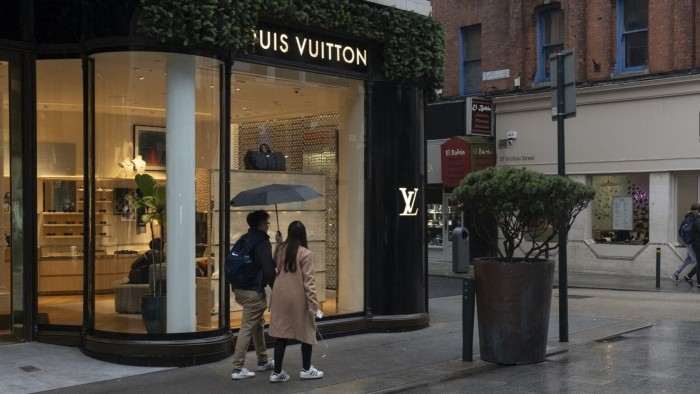Unlock the Editor’s Digest for free
Roula Khalaf, Editor of the FT, selects her favourite stories in this weekly newsletter.
A cursory glance at the luxury industry would suggest that its fortunes are inextricably linked to China. The country’s consumers went from spending virtually nothing on high-end trinkets at the turn of the millennium to accounting for roughly 30 per cent of the sector’s sales. Their woes have been blamed for much of the recent slowdown.
But a new frontier beckons for luxury brands like Louis Vuitton and Gucci. The race is on for the heart and wallet of the consumer in the American heartland.
Historically, the US market has not been overwhelmingly receptive of old-continent “maisons”. They have concentrated their presence in core cities such as New York, Chicago, Los Angeles and San Francisco. Luxury spend is about 0.4 per cent of GDP, according to Bernstein’s analysis. Europe and Japan spend half as much again as a proportion of GDP and the share of luxury in fashion-conscious South Korea is more than double US levels.
Yet there are signs that peddlers of high fashion are starting to make headway in the New World. UBS estimates that US consumers accounted for about a quarter of the sector’s growth since 2015 — about the same as China — to reach 22 per cent of sales in 2023. While growth flagged last year as cost of living concerns hit aspirational shoppers, there are signs that it has revived so far into 2024.
Changing aesthetics may also be giving luxury a leg up. Streetwear, casual luxury and a focus on accessories should broaden the sector’s appeal beyond its traditional customers, and provide tech bros with a valid alternative to shorts.
Luxury groups have cottoned on to the US opportunity. New store openings in the country rose by 12 per cent in 2023, according to Savills. That’s in stark contrast with a 13 per cent fall in new store launches globally. And not all of those new US outlets are on Fifth Avenue or Rodeo Drive. Miami, Atlanta and Las Vegas are popular locations. LVMH’s Givenchy has just opened its first store in Dallas. Openings in malls are on the rise.
This trend should continue. China is suffering a well-documented slowdown, which the latest stimulus package will only partly address. In the US, meanwhile, Donald Trump’s election victory has propelled the S&P 500 to a 25 per cent rise this year. A lot of people will no doubt be feeling very flush.
Not all brands will benefit from luxury’s increasing appeal in the US. Those with homegrown problems — think Gucci parent Kering and Burberry — are seeing sales decline well beyond what is explained by Chinese spending. Yet it could provide a new growth runway in a sector that has been looking increasingly threadbare.
Read the full article here

